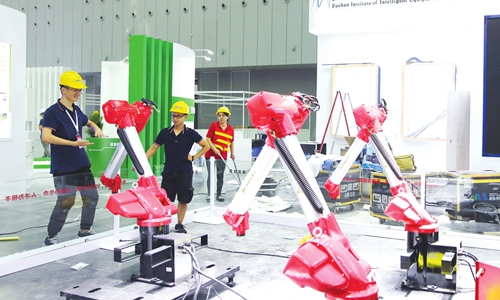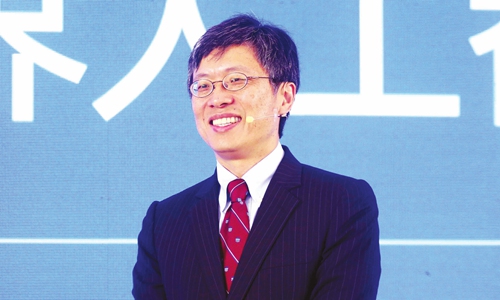HOME >> BUSINESS
Chinese technology talent in the US facing choice to stay or leave
By Song Lin and Chi Jingyi Source:Global Times Published: 2019/11/19 17:48:40
The innovation center of the world shifting to China: expert

Employees arrange machines during the Guangdong International Internet Plus Expo in October. Photo: IC

Microsoft senior executive Harry Shum Photo: IC
Chinese technology talent in the US tends to return to China for better opportunities, as the rapid development of the Asian country's high-tech sector proves magnetic.
"My future development will be in China. It's an attractive market. You need go back as early as you can to adapt to the environment and build your network of contacts," said Sheng Honglei, a Chinese graduate with a master's degree in electrical engineering from the University of Chicago.
He received several full-scholarship doctoral offers from US universities, but had determined to return to China.
In fact, it is not only fresh graduates that are facing a choice between returning to China and continuing their careers in the US. Veteran engineers and senior executives who have served US tech giants are also at this crossroads. A new round of discussions concerning the choice has been sparked by Chinese Microsoft senior executive Harry Shum's recent departure from his position.
Shum, executive vice president of US tech giant Microsoft's artificial intelligence (AI) and research group, will be leaving office early next year, according to an internal letter sent to Microsoft staff from CEO Satya Nadella.
Though he will officially depart in February, his title has already been transferred to an advisor of both Microsoft CEO Satya Nadella and company founder Bill Gates, read the letter.
Shum started serving Microsoft in 1996. His exit from Microsoft marks the departure of one of the last popular Chinese senior executives from the core management team of a well-known US tech giant.
Chinese netizens on China's Twitter-like micro-blog Weibo applauded the choice made by Chinese high-tech talent in returning to China to contribute to its economic development. "The motherland will always welcome you," a Weibo user posted.
Though there are still a great number of Chinese engineers working in the research and development (R&D) sector under US tech giants, more than a dozen well-known Chinese senior executives have left Silicon Valley in recent years, Liu Dingding, a Beijing-based independent industry analyst, told the Global Times on Monday.
"Most have chosen to join rapidly growing Chinese tech firms," he said.
For instance, Lu Qi, Microsoft's former executive vice president in charge of the company's applications and services unit, left office in 2016 and then joined Chinese tech giant Baidu, taking the post of chief operating officer.
The reasons behind this are mainly the escalating China-US tech competition and China's highly attractive work and business environment, experts and Chinese engineers in the US said.
Senior executives who were born in China or have any kind of Chinese background have faced increasingly restricted promotion opportunities, said Liu.
Cultural differences
A young Chinese engineer currently working at Microsoft spoke of her career dilemma in the US.
"I think the cultural difference is one of the critical challenges, followed by [my] English language level, which hinders communication," the 29-year-old, who requested she be referred to by the pseudonym Cici, told the Global Times.
Cici achieved a TOEFL score of 112 out of 120 and has lived in the US for nearly seven years, but still she feels she cannot express herself well in English at work.
Though she has no problem communicating with people in daily life, she said that, "Sometimes I just cannot express my thoughts to my boss and colleagues fluently and accurately. My boss doesn't think language is the problem, but that my logic is not rigorous enough," said Cici.
Cici also said that she feels it difficult to speak and think as a native because she moved to the US after her undergraduate degree.
A different cultural background is like an invisible barrier for most Chinese staff in the US, according to Chinese-born engineers.
Moreover, the stereotypical character of a restrained Chinese person is a restrictive element when attempting to break through the "glass ceiling" at work, even when it comes to normal promotions.
Speaking of the competition among foreign staff in US tech firms, Cici cited her Indian coworkers who are more adapted to the environment with more knowledge of US social manners. This sentiment was echoed in media reports showing that senior executive positions previously held by Chinese people are now been taken over by Indian employees.
"Also, Indians are different to [my] other Asian colleagues because they are native speakers. They don't have a language barrier and they have a Western way of thinking," said Cici.
"I think that's a very important reason why Silicon Valley now has many Indian executives," she said.
"Chinese [people] are actually strong in terms of researching and developing technologies. Our humble character, which is always seen as unconfident in the US, could be a disadvantage here," Cici said, adding that it's hard to change one's mindset.
After being entangled in a similar dilemma, Zong Chang, who obtained her master's degree in urban planning from Harvard University and is now employed in the US, is planning to move back to China.
"I know I will go back to China someday," Zong said, noting that the choice has become clearer for her.
China is the largest source of international students in the US for the 10th consecutive year in 2019, according to the 2019 Open Doors Annual Data Release jointly published by the US' Bureau of Educational and Cultural Affairs and the Institute of International Education.
The Open Doors report is a comprehensive information resource for international students and scholars studying or teaching at higher education institutions in the US.
Chinese students, numbering 369,548, accounted for 33.7 percent of all international students in 2018-19, followed by students from India, who accounted for 18.4 percent. Together with South Korea, accounting for 4.8 percent, students from the three Asian countries made up more than half of international students in the US.
"US companies give quotas to each ethnic group when they hire staff. Even if you may be better than applicants from other ethnic groups, you may be excluded because of the quota," Sheng told the Global Times.
According to data from China's Ministry of Education, 3.65 million Chinese people who studied overseas from 1978-2018 had returned to China, accounting for about 85 percent of the total.
Magnetic market
The Chinese market, by contrast, has a magnetic effect for global talent, according to an industry analyst.
The rapid development of the Chinese high-tech sector, particularly the internet industry, is the fundamental reason that Chinese executives and engineers in the US are drawn back to China, said industry analyst Liu.
The innovation center of the world is shifting to China, with many newly invented technologies such as mobile payment, 5G networks and a mass of AI-related products, not to mention China's well-developed e-commerce sector, Liu said.
Though the US maintains a better research base including for the AI field, China, by contrast, has a much larger market which facilitates the broader application of new technologies, Chen Yujie, a Beijing-based senior AI R&D engineer, told the Global Times.
For instance, China has many online food-delivery platforms which need to be supported by a sufficient market, Chen said, noting that various scenarios in the Chinese market are also lucrative for Chinese senior executives in the US who wish to start their own businesses.
With a huge potential market and a set policy of continual opening-up to foreign investment, China will maintain its position as a critical market for multinational tech giants, Liu noted.
Posted in: INDUSTRIES,ECONOMY